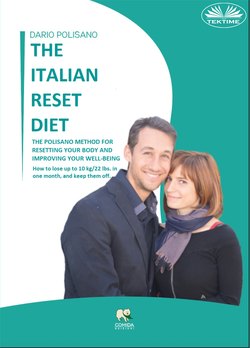Читать книгу The Italian Reset Diet - Dario Polisano - Страница 14
CHAPTER 2
THE HORRORS OF COMMON DIETETICS
Proteins to Watch Out For if You Want to Hurt Yourself
ОглавлениеFor years, there has been a media campaign against nutrients that our bodies could not do without: proteins. How many times have you been admonished to be careful how many proteins you take in because of their alleged negative effects on the kidneys and liver? Too bad all that news is unfounded. Since so many people love to talk about scientific studies, I will tell you that in reality there is no scientific study that confirms the supposed negative effects of a healthy person eating an excess amount of proteins. The studies showing that proteins can damage the kidneys were conducted on nephropathic patients—that is to say, on patients with kidney disease. That is akin to saying that patients with third degree burns should not be exposed to the sun because it can burn their skin even more! What’s more, as you have no doubt concluded yourself, there are scads of studies and counter-studies that can create crazy amounts of confusion. Further studies have shown that nephropathic people, being catabolic, lose more proteins with respect to healthy people, and so must consume more proteins to counteract excess protein catabolism. So who should we listen to? Let's employ some logic! Going by the anti-protein strain of logic, athletes should all be nephropathic due to their excessive protein consumption. And what about the peoples of North America who are forced to fight against the cold, and whose nutrition is based on large quantities of fish (including salmon and whales)? They certainly do not have damaged kidneys. Furthermore, going off the previous chapter, cardiovascular pathologies there are almost unheard of. Let's move on to the other myth about this macronutrient—the notion that meat proteins cause cancer. If this were the case, mankind would have gone extinct, given that prehistoric man fed largely upon meat and fish, and knew not of cereals! But of course, mention that and the expert-of-the-moment jumps in to claim that the average age of the primitive man was thirty. I reply to these geniuses that they would not be able to survive a single day in the middle of the jungle, without heating, without a home, without drugs and without a refrigerator! Primitive man died only from infections that resulted from injuries caused during the hunt or clashes with his fellow men. There were no chronic degenerative diseases. These appeared shortly after the start of cereal cultivation, but especially after the Second World War with increased industrialization. Tumors, in general, might be produced by a diet rich in sugars and dairy products. The only meat proteins to avoid are pork proteins. Epidemiological studies are clear on this, as we will see in later chapters.
Much of our bodies is made up of proteins: organs, skin appendages and DNA. Protein deficiency can lead to:
● the metabolism slowing down;
● a poor immune system response*;
● skin appendages falling out;
● asthenia;
● mental confusion and depression;
● poor muscle growth;
● edemas with swollen hands and eyes;
● sarcopenia;
● kwashiorkor: a deficiency of alumina, a protein whose deficiency triggers a phenomenon called osmosis, causing water to escape from the blood vessels into the tissues. This causes the abdomen to swell.
Obviously, it is almost impossible to find that last one in the Western world, but all the other points are, I think, everyday occurrences. Absurdly, many suffer from excess weight and, at the same time, hair loss and nail problems. This is all due to a diet with an abundance of sugars and carbohydrates that is also low in protein. What about fatigue, mental confusion and depression? I think many of you are finding yourselves in what I am saying. Not to mention low muscle growth or sarcopenia, the latter very present in the elderly, who should be consuming more proteins than a man of average age due to the low protein synthesis typical of old age. I marked one of the previous points with an asterisk. In point of fact, a poor immune response may be at fault, present in people who consume fewer proteins than needed, as well as in people who manage to take in their proper protein quota but use proteins unsuitable for their immune system, which, as you will see, lead to the development of autoimmune diseases.
Proteins activate glucagon, a hormone that enables weight loss. There are those who claim that proteins make you fat, but have they ever studied biochemistry?
I have been to Africa, in the area where there are no wars and where they do not have the possibility to buy food. Where I stayed, they eat meat for lunch and dinner and snack on dried meats. Breakfast? Eggs! Any obesity in the population, you may ask? It is almost nonexistent. But there is no need to travel that far; come to my office, and you will see the results of a diet low in carbohydrates and rich in fats and proteins.
